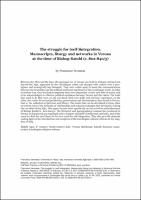Chapter The struggle for (self-)integration. Manuscripts, liturgy and networks in Verona at the time of Bishop Ratold (c. 802-840/3)
Abstract
Between the 780s and the 840s the episcopal see of Verona was held by bishops coming from beyond the Alps, appointed by the Carolingian rulers and charged with control over a prestigious and strategically key bishopric. They were called upon to boost the communications between the local elites and the political and social machinery of the Carolingian world. In order to achieve that, they first had to negotiate their own integration in their new field of action, and to be acknowledged as effective political mediators between Verona and the rulers. The tools they used to do that were, on the one hand, their own skills and previous experience, on the other, the centre for textual production, preservation and dissemination they found in Verona, that is, the cathedral scriptorium and library. The books that can be attributed to them allow us to keep trace of the networks of relationships and cultural exchanges they developed, linking the two sides of the Alps. This paper focuses more specifically on the activities and endeavours of Bishop Ratold (c. 802-840). The liturgical and hagiographical manuscripts produced in Verona in that period are examined as key markers of Ratold’s intellectual networks, and of the ways in which he used them for his own need for self-integration. They also provide elements casting light on the introduction and reception of the Carolingian cultural reforms in the Kingdom of Italy.
Keywords
Middle Ages; 9th century; North-Eastern Italy; Verona; Reichenau; Ratold; liturgical manuscripts; Carolingian religious reforms.DOI
10.36253/978-88-5518-623-0.05ISBN
9788855186230, 9788855186230Publisher
Firenze University PressPublisher website
https://www.fupress.com/Publication date and place
Florence, 2022Series
Reti Medievali E-Book, 41Classification
History


 Download
Download Web Shop
Web Shop